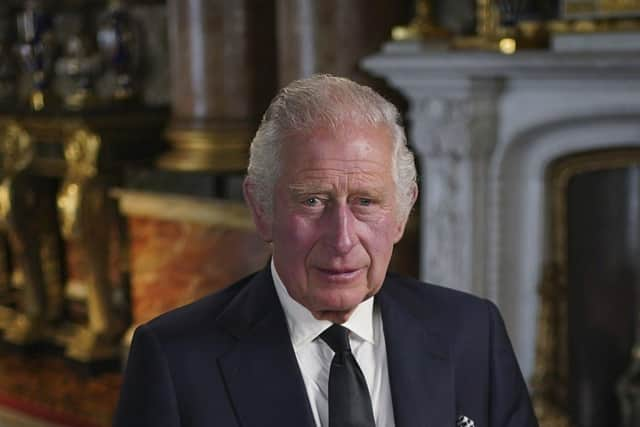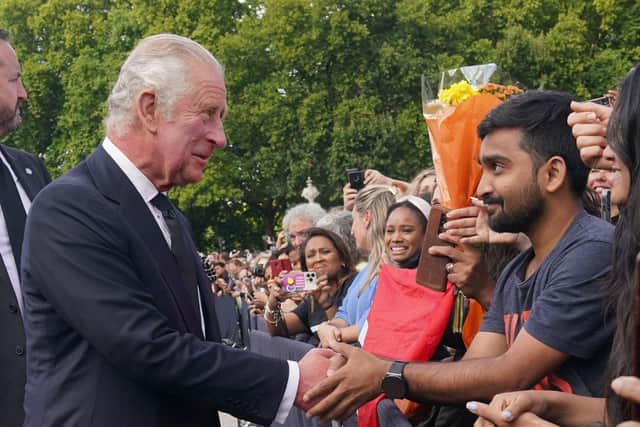Queen's death: King Charles III vows to serve with ‘loyalty, respect and love’
In his first televised address as head of state to a nation bereft of its symbol of continuity and resilience, King Charles III offered a personal and heartfelt tribute to his “darling mama”, while reassuring the country that his reign would be one of “life-long service”.
Outlining his vision of a monarchy fit for the 21st century, he announced his eldest son, William, would become the Prince of Wales, with his wife, Catherine, becoming the Princess of Wales. William, his father said, also assumed the Scottish titles which had “meant so much” to him.
Advertisement
Hide AdAdvertisement
Hide AdIn an acknowledgment of the couple’s popularity and profile, the King expressed confidence they would “continue to inspire and lead our national conversations”, and help to “bring the marginal to the centre ground”.
Even for a speech that had been years, if not decades, in the making, it was meticulously constructed, yet never felt stilted. It combined emotional candour with political acuity, while also seeking to bind the wounds in his own family.
No reign, let alone one in its infancy, can be appraised by a single address, but there was the outline of an answer to the question that has been asked countless times over the years – what kind of king will Charles be?
One created in his mother’s image, it turns out. Time and again, he praised the late Elizabeth II, who maintained an “abiding love of tradition” alongside a “fearless embrace of progress”.
The 96 year-old’s life, he said, was one well lived - “a promise with destiny kept” - and he recalled the pledge she made as a 21-year-old princess to devote her life, no matter how long or short, to the service of her people.


“That was more than a promise, it was a profound personal commitment which defined her whole life,” said King Charles. “She made sacrifices for duty.”
In leading the mourning for the only monarch most Britons have ever known, the King made it clear he too would endeavour to serve with “loyalty, respect, and love,” and noted “my life will, of course, change”.
He explained: “It will no longer be possible for me to give so much of my time and energies to the charities and issues for which I care so deeply. But I know this important work will go on in the trusted hands of others.”
Advertisement
Hide AdAdvertisement
Hide AdThose remarks will perhaps be overlooked given the emotional power of his historic speech, but their significance cannot be understated. Only four years ago, Charles intimated that he would not “go on in exactly the same way,” once he became head of state.


Now that he is King, he made clear he had steadied himself for the Crown’s weight, and explicitly acknowledged the role of heir and that of monarch are very different indeed.
Indeed, change and continuity were key themes in the speech. He spoke of how in the 70 years since his mother first took to the throne, the institutions of the state had changed, with British society also becoming one of “many cultures and many faiths”.
Yet throughout it all, he went on, “our values have remained, and must remain, constant”.
The nine-and-a-half minute-long address, which was pre-recorded earlier in the afternoon at Buckingham Palace’s blue drawing room, also saw the King seek to unite not just the country, but his own flesh and blood.
It was, he said, ”a time of change for my family”. And after praising his “darling wife” Camilla, the Queen Consort, and William and Kate, made a telling final tribute.
“I want also to express my love to Harry and Meghan as they continue to build their lives overseas,” he added.
As the broadcast aired, a service of thanksgiving for Queen Elizabeth II got underway at St Paul's Cathedral, where the attendees sang the first official rendition of God Save the King.
Advertisement
Hide AdAdvertisement
Hide AdSuch symbolic moments were plentiful on the first full day since Elizabeth II’s death was announced.
King Charles and the Queen Consort left Balmoral just after 11:20am, travelling to Aberdeen Airport where they boarded a private charter flight to RAF Northolt in west London.
When it landed soon after 1:35pm, the couple made the journey along the A40 to Buckingham Palace in a 1953 Rolls Royce Phantom VI, with the Royal Standard flying proudly from its roof.
As their motorcade turned Hyde Park Corner a little over half an hour later, slowing amidst the large crowds outside the palace, sporadic shouts of “God save the King” and “Long live the King” rang out.
When the car stopped, the King stepped out to meet members of the public. In scenes reminiscent of his late mother’s walkabouts, he spent close to nine minutes making his way down the line, shaking hands, briefly chatting with well-wishers, and thanking them for their condolences.
One woman kissed his hand. Another, Jenny Assiminios, from Cyprus, asked if she could kiss him. The King nodded, and she wasted little time in reaching over the barrier to hug him and plant a kiss on his cheek. “I felt very happy,” she said afterwards.
At 2:20pm, King Charles reunited with his wife and, after briefly consulting Clive Alderton, the king’s principal private secretary, they paced by the hundreds of floral tributes to his mother that had been left by the palace gates and wrought iron fences. Minutes later, the couple were alone again, as they left the crowds to walk side by side into the palace quadrangle, and their new home. As they did so, the Royal Standard was raised.
Around 90 minutes later, Prime Minister Liz Truss arrived at the palace for her first weekly audience with the king, as the two most senior figures at the top of British life came together for the first time. The meeting lasted around a half hour.
Advertisement
Hide AdAdvertisement
Hide AdIt was among the first of the public and constitutional duties that await the new King, while he also mourns the loss of his beloved mother.
On Saturday morning, he will officially be proclaimed king at the Accession Council in the state apartments of St James’s Palace. The ceremony will be televised for the first time, with the proclamation also read aloud from the palace balcony overlooking Friary Court.
It is another small change to ancient dynastic protocols, but cumulatively, they perhaps explain why the centuries-old institution of the monarchy remains, having weathered countless storms.
Already Charles III has started to play his part in that endless process of renewal. "Something as curious as the monarchy won't survive unless you take account of people's attitudes,” he once said. “After all, if people don't want it, they won't have it.”
His journey to the throne has been long, but the hard work starts now.
Comments
Want to join the conversation? Please or to comment on this article.